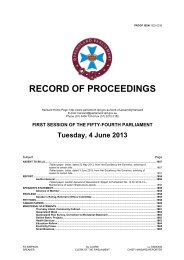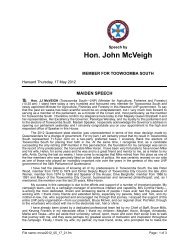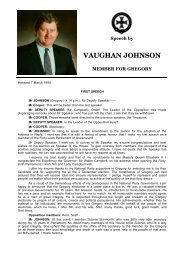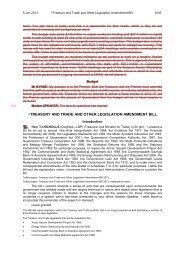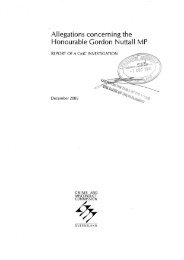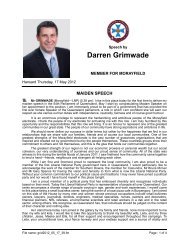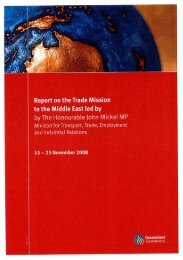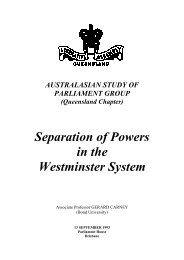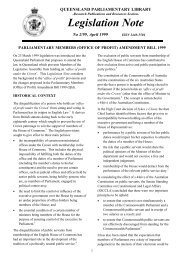weekly hansard - Queensland Parliament - Queensland Government
weekly hansard - Queensland Parliament - Queensland Government
weekly hansard - Queensland Parliament - Queensland Government
You also want an ePaper? Increase the reach of your titles
YUMPU automatically turns print PDFs into web optimized ePapers that Google loves.
2640 Child Safety Legislation Amendment Bill 23 Aug 2005<br />
where these communities are concerned would be an advantageous move towards meeting the special<br />
needs of these children.<br />
Secondly, while I applaud the introduction of voluntary care orders as one means of preventing<br />
child safety issues, I would like to know how this measure is going to be actioned. It has been repeatedly<br />
reported in the media that priority 1 cases—where children are considered to be at an extremely high<br />
risk of sexual or violent abuse, torture or suicide—are not being investigated within the required 24-hour<br />
period. If the government budget cannot extend to employing sufficient staff within the department to<br />
meet this most urgent situation, how will the department possibly find the staff or have the time to<br />
undertake the complex process of not only deciding what preliminary measures may prevent having to<br />
take out a protection order but also facilitating such actions.<br />
On the issue of staff, I was deeply concerned to read an article in the Courier-Mail on 4 August<br />
that showed case workers receive low, uncompetitive pay rates compared to administration officer and<br />
receptionist positions in the same department. The article went on to say that the <strong>Queensland</strong><br />
government web site was advertising five jobs for case workers and specified that tertiary qualifications<br />
in social work or behavioural sciences were a must. When one considers the toughness of the job<br />
undertaken by case workers and the poor pay rates, it must be difficult to attract staff with seniority and<br />
experience. I would also appreciate the minister’s response in this regard.<br />
I applaud the amendment circulated by the minister today. Section 142D(2)(d) has been added to<br />
allow the transfer of information between the <strong>Queensland</strong> Police Service and the Commissioner for<br />
Children and Young People and Child Guardian of offences or alleged offences of any person who<br />
applies for a certificate of approval or licence. This amendment is designed to make certain that the<br />
commissioner has the latest information on every applicant. No doubt the question whether this is an<br />
encroachment upon human rights will be raised by some in the community, but I am sure that<br />
honourable members will agree that the safety of our children is paramount. It is good to see the<br />
minister is tightening up some of the loopholes remaining in this important bill.<br />
In summation, many of the recommendations of stage 2 are yet to be implemented. There are<br />
budget and time frame blowouts surrounding the new integrated client management system and an<br />
ongoing failure to apply sufficient funds at a grassroots level. The Beattie government must now honour<br />
its promises to protect our most precious gifts in life—our children. Rather than merely rolling out this<br />
final stage, the government needs to continually check the successes and the failures of what has<br />
already been implemented. Nonetheless, the concept behind stage 3 of the Child Safety Legislation<br />
Amendment Bill is well intentioned and offers hope to shattered young lives. With that I commend the bill<br />
to the House.<br />
Mrs CARRYN SULLIVAN (Pumicestone—ALP) (9.29 pm): We all know how important child<br />
safety is. I rise to speak tonight specifically about how this bill will improve outcomes for children who<br />
are in contact with the child protection system. This bill is the third stage of legislative reform to support<br />
implementation of the recommendations of the CMC report, Protecting Children: an inquiry into abuse of<br />
children in foster care. The opposition spokesperson would have us rush through these<br />
recommendations. However, that is not the answer. These problems are ongoing and we are looking for<br />
the best outcomes and sometimes this takes time.<br />
Stage 3 addresses the regulating of voluntary placements, the regulating of all carers, refining the<br />
Indigenous child placement principle and consulting indigenous agency stakeholders.<br />
These amendments, which are expected to commence in April 2006, are directed at improved<br />
outcomes for children in the following ways.<br />
Firstly, the regulation of voluntary placements will enable the chief executive to enter into care<br />
arrangements, without a child protection order, with a child and a child’s parents. Care agreements<br />
emphasise working cooperatively with families to support and help them undertake their parenting<br />
responsibility to care for their children safely. This may include placing a child in alternative care with kin<br />
or a foster-carer.<br />
A care agreement for the child cannot extend beyond 30 days unless a written case plan has<br />
been developed for the child. This means that the department must pay careful attention to the child’s<br />
needs while the department is working with the child and his or her parents. Care agreements will not be<br />
extended without a review of the progress made under the child’s case plan.<br />
Secondly, regulating all carers is based on the presumption that all children placed by the<br />
department in out-of-home care are entitled to the same standard of care in accordance with the<br />
statement of standard in section 122 of the Child Protection Act 1999. Whether a child is placed with an<br />
approved kinship carer or foster-carer or, for a period, with a provisionally approved carer, the carer and<br />
adult members of their households will be screened for suitability to care for a child. Foster and kinship<br />
carers will also be assessed, including by interview, home visit, checks on employment history and<br />
health status, and personal references. All carers will be required to meet the statement of standards,<br />
including respect for the child’s rights, dignity and culture, and meeting the child’s emotional, physical,<br />
health and educational care needs. The statement of standards prohibits corporal punishment or other<br />
behavioural management techniques which would cause emotional harm to the child.



